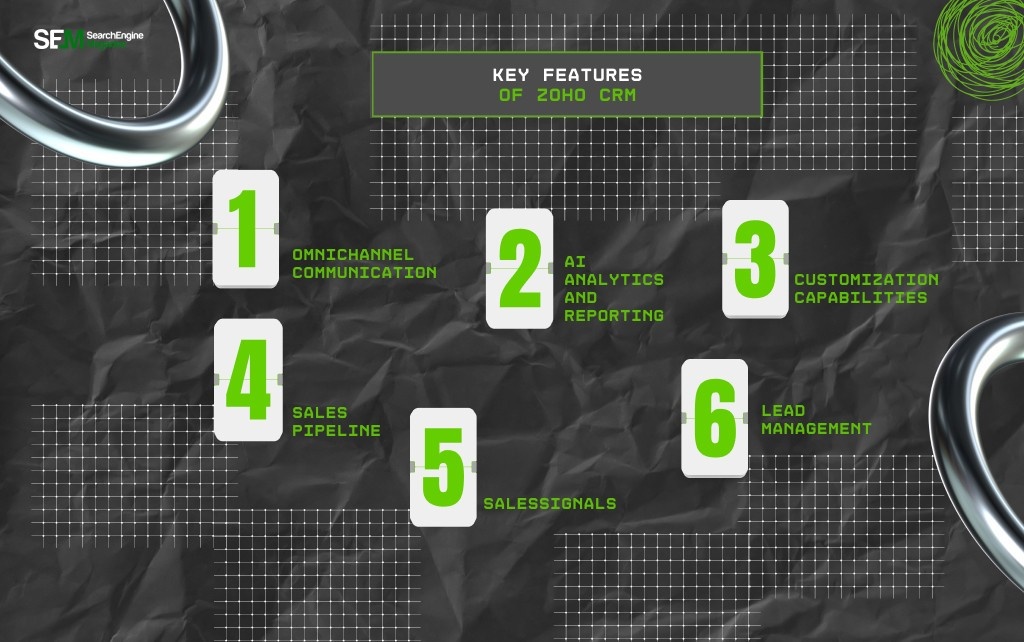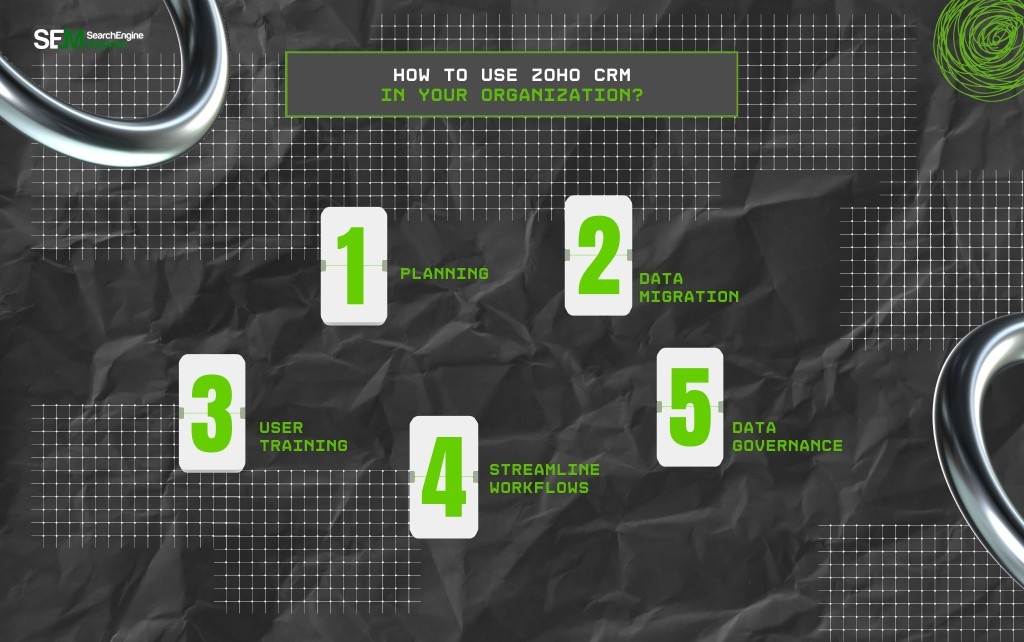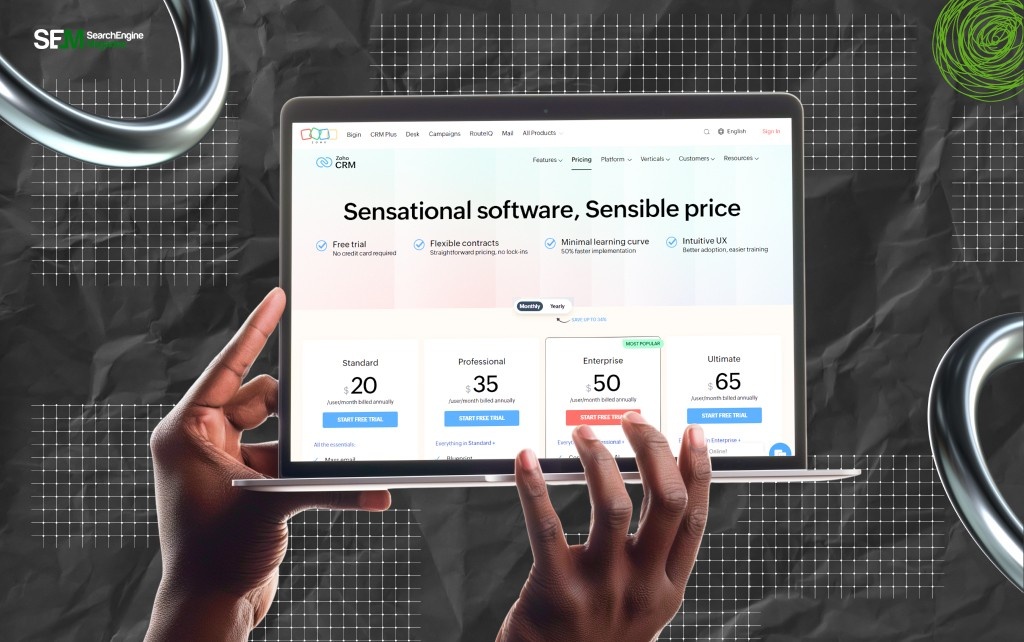How Law Firms In San Francisco Can Benefit from SEO
Feb 28, 2026

Feb 28, 2026

Feb 28, 2026

Feb 27, 2026

Feb 27, 2026

Feb 26, 2026

Feb 26, 2026

Feb 25, 2026

Feb 25, 2026
Sorry, but nothing matched your search "". Please try again with some different keywords.


Tracking leads and managing contacts in a business can be quite difficult. Especially with diverse customer data, it can be challenging to organize and store it in a jiffy.
That’s why they adopt a CRM model to enhance the customer management system.
Moreover, the CRM platform helps with storing, organizing, and analyzing customer data to identify prospects and convert them into loyal customers. Making the entire sales cycle a piece of cake.
In addition to this, many CRM models come with an advanced set of features that remarkably simplify trend predictions and automated services. So, naturally, they are popularized in the market.
But among the countless tools available, Zoho CRM takes the spotlight for its unique features and dynamic capabilities. Making it an all-rounder CRM platform for diverse industries.
So, if you are also wondering — “Is this customer management tool really worth the hype?” I have got you covered.
In this blog, I am going to debunk exactly that by exploring the diverse aspects of Zoho CRM and discussing—
Stay tuned!
First things first, Zoho provides a beginner-level CRM model, designed for scaling the sales growth with its centralized customer management features.
That is, it offers diverse features that track leads, store customer data, automate the workflow, and generate analytical dashboards based on the data. Making customer management easy peasy.
As the report from Clarion Technologies highlights—
Moreover, it comes with high customization and integration capabilities. That is, users can integrate other third-party tools to enhance its functionalities. So, it helps boost productivity.
In addition to this, it has AI-driven features for automation, dashboard reporting, and analytics. So, users can gain insightful reports and make informed decisions about managing their leads.

Some of the key features of Zoho CRM include—

Unlike other CRM platforms, Zoho can be used for a variety of operations within the customer management system. So, here is how to use it effectively for sales management.
Firstly, to employ Zoho CRM, businesses need to delve into proper business planning. That is, they need to align the goals with the actions to create a clear strategy blueprint for Zoho CRM implementation.
The next step is to migrate the customer data to the platform’s database. So, businesses need to migrate the CSV files with customer data and clean the datasets for proper data analysis and reports.
Moreover, the workers in the business need to be trained to use the platform for tracking and managing the leads. So, preparing training programs and hands-on experience with the model can help employ the system faster.
As the model is successfully implemented, it can be used for streamlining the workflow. That is, businesses can use Zoho’s automation features to design the alerts, automated services, and more.
Moreover, they can integrate third-party tools within the platform to streamline diverse operations. So, it becomes easier to track, organize, and manage the entire customer management cycle.
Finally, users need to configure the access and edit permissions for the data files and other processes in Zoho CRM. This way, they can comply with the industry standards of data governance and data security.
As the report from Clarion Technologies points out—
As a customer management platform, Zoho CRM comes with its own set of benefits and challenges. So, here are its pros and cons of using the platform.
| Pros | Cons |
|---|---|
| 1. Offers a highly customizable model within an affordable price range. | 1. Limitations of certain features with integrations. |
| 2. Provides a comprehensive suite of features for managing sales and customer relations. | 2. Might be complex for beginners. |
| 3. Supports robust integration of both native and third-party tools for enhanced productivity. | 3. Cluttered and less intuitive interface. |
Even though Zoho CRM offers massive benefits for customer management, it comes with a set of limitations that prevent it from outperforming its competitors. Some of these limitations include—

Zoho CRM is a semi-paid platform. That is, it offers both free and paid plans for different sets of features. So, here is a simple breakdown of its pricing model.
| Plan | Pricing | Features |
|---|---|---|
| Free | $0 | Basic CRM features for email tracking, managing leads and accounts, viewing data, and running mobile apps. |
| Standard | $20 per month | Moderate features for filtering, evaluating email insights, 155 custom fields, and up to 10 scoring modules. |
| Professional | $35 per month | Advanced features with macros, multiple currencies, email parsing, inventory tracking, and predicting sales trends. |
| Enterprise | $50 per month | Massive range of advanced features, AI assistant Zia, over 500 custom fields, analytics, and unlimited custom reports. |
| Ultimate | $65 per month | Comprehensive suite of features with unlimited custom dashboards, extensive AI tools, technical support, and analytics. |
Although Zoho is currently a top CRM platform in the market, its AI adoption promises future innovation and developments in the customer management system.
For instance, there is a high chance of hyper-automation of the complex workflows. That is, making it easier for businesses to manage and track potential leads.
Moreover, its high customization capabilities, along with the touch of AI models, can enhance the personalization of the tools. So, users can specifically use the tools that they need, instead of juggling redundant features.
In addition to this, the AI technology can further help in predicting future sales trends based on pattern recognition. Making it easier for businesses to stay prepared for risks and changes in market dynamics.
Now, CRM platforms can essentially tweak the customer management system. That is, employing them can immensely improve lead generation, customer conversion, and build loyal relationships.
So, if you haven’t tried a CRM tool to streamline your customer management, it’s high time to employ one like Zoho to boost the efficiency of the management system.
Here are some of the common questions around the CRM system of Zoho that most users look for.
Yes, absolutely. Migrating from Salesforce or HubSpot to Zoho CRM is quite easy. So, users can either use the built-in tools of HubSpot or manually migrate the data files from Salesforce.
But before transferring the data, make sure they are organized and cleaned. That is, any duplicate or dissimilar items are removed. This way, the migration can be done smoothly.
Similar to the Zoho CRM, there are many tools available on the market. So, some of the alternatives to Zoho include—
Salesforce — Provides a broad CRM model with advanced features and an AI-driven suite for managing sales and customer details.
HubSpot — Offers an easy-to-use interface with advanced automation features, particularly designed for small teams and businesses.
Microsoft Dynamics — Supports sales management and customer relations within the Microsoft ecosystem.
Freshworks — Provides a simple platform for handling multiple tools in a centralized space without switching between third-party apps.
Yes, absolutely. Since Zoho CRM offers a wide suite of features and tools for managing sales, it is suitable for both large businesses and enterprises.
Moreover, it offers diverse AI-driven automation and analytics with top-notch data security protocols. Making Zoho a scalable option for sales management. So, enterprises can employ it easily.
Unlike other CRM models, Zoho CRM employs a robust data encryption model that offers strong data security and privacy. For instance, its AES-256 data encryption helps protect the data files stored in the system.
Moreover, for data transits, it offers TLS 1.2 or 1.3, which ensures the data is not breached while processing the transfer. In addition to this, it complies with industry data security standards — GDPR, HIPAA, and even ISO 27001.
Read Also:
Chandrima is a seasoned digital marketing professional who works with multiple brands and agencies to create compelling web content for boosting digital presence. With 3 years of experience in SEO, content marketing, and ROI-driven content, she brings effective strategies to life. Outside blogging, you can find her scrolling Instagram, obsessing over Google's algorithm changes, and keeping up with current content trends.
View all Posts
How Law Firms In San Francisco Can Benefit fr...
Feb 28, 2026
The Power Of Internal Linking For Restaurant ...
Feb 28, 2026
Can You Play The Google Zipper Game In 2026?
Feb 27, 2026
How To Make Money On Instagram? The EASIEST C...
Feb 27, 2026
AI Workflow Automation In The Era Of Google U...
Feb 26, 2026

